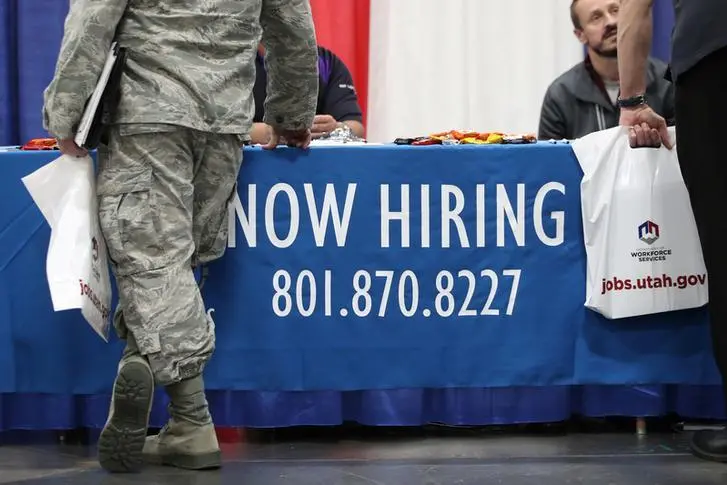PHOTO
U.S. job growth probably slowed to a still-solid clip in April, with wages maintaining their steady rise, which would allay fears that the economy was stalling after activity pulled back considerably in the first quarter.
The Labor Department's closely watched employment report on Friday is also expected to show the unemployment rate holding below 4% for the 27th straight month. Labor market endurance, however, leaves the Federal Reserve in no rush to start cutting interest rates, which could significantly slow down the economy.
The U.S. central bank on Wednesday left its benchmark overnight interest rate unchanged in the current 5.25%-5.50% range, where it has been since July.
"The bloom is off the rose of a strong employment market, but it's still pretty," said Sung Won Sohn, finance and economics professor at Loyola Marymount University. "A slow, but healthy job market will continue well into 2025. The only situation where I see a dramatic decline will be if the Fed keeps rates high for too long."
Nonfarm payrolls likely increased by 243,000 jobs last month after rising 303,000 in March, according to a Reuters survey of economists. Job gains would be slightly below the 276,000 monthly average in the first quarter.
Estimates ranged from 150,000 to 280,000. The labor market has so far defied predictions of a sharp slowdown flagged by surveys including the Institute for Supply Management and the NFIB. The ISM's services employment measure has been largely weak since last October.
The NFIB's gauge of small business hiring slumped to near a four-year low in March before rebounding in April.
Most economists have, however, cautioned against reading too much into the surveys, arguing that they have not offered reliable signals on nonfarm payrolls over a long time. They were also not perturbed by a near stall in worker productivity in the first quarter, noting that the trend remained solid.
"I don't see any real signs of distress," said Dan North, senior economist at Allianz Trade.
UNEMPLOYMENT RATE SEEN STEADY
Economists were also dismissive of the continued decline in temporary help staffing, normally viewed as a harbinger for future hiring. Temporary help has dropped in 23 of the last 24 months. They noted that companies continued to hoard workers.
Employment gains have been driven by healthcare, state and local governments, construction sectors as well as the leisure and hospitality industry, which are trying to boost staffing levels after losing workers during the COVID-19 pandemic.
That pattern is expected to hold in April.
Average hourly earnings are forecast rising 0.3%, matching March's gain. There is, however, an upside risk as about half a million workers at California fast food chains started receiving a $20-an-hour minimum wage in April.
"We would normally look for another increase of 0.3%, which was the monthly average in both the fourth quarter of 2023 and the first quarter of 2024," said Lou Crandall, chief economist at Wrightson ICAP. "However, we expect the increase in the minimum wage for fast-food workers in California to translate into an increase of nearly 1% in hourly earnings in the leisure and hospitality industry in April, which would nearly add a tenth of a percent to the national average."
Wages are forecast increasing 4.0% in the 12 months through April after rising 4.1% in March. Wage growth in a 3%-3.5% range is seen as consistent with the Fed's 2% inflation target.
Financial markets continue to expect the central bank to start its easing cycle in September. A minority of economists believe the window is closing. Since March 2022 the U.S. central bank has raised its policy rate by 525 basis points.
The unemployment rate was forecast unchanged at 3.8% in April. The labor market has benefited from a surge in immigration over the past year, which economists estimated boosted labor supply by about 80,000 per month in 2023.
"While we believe the continued flow of new immigrants into the labor market boosted payroll and household employment in April's report, we do not forecast an impact on the unemployment rate due to the offsetting boost to labor supply," said Spencer Hill, an economist at Goldman Sachs. (Reporting by Lucia Mutikani; Editing by Andrea Ricci)





















